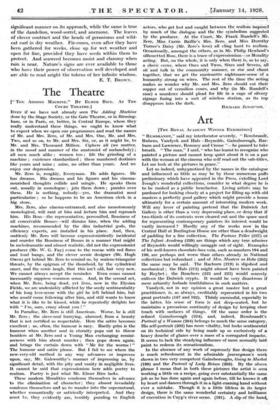The Theatre
[" THE ADDING MACHINE." BY ELMER RICE. AT THE COURT THEATRE.]
EVEN if we have not already seen The Adding Machine done by the Stage Society, or the Gate Theatre, or in Birming- ham, or in Paris, or, better, in Central Europe, where they really understand these things, we ought to know what to expect when we open our programmes and read the names of Mr. and Mrs. Zero, of Mr. and Mrs. One Mr. and Mrs. Two, and so on, to Mr. and Mrs. Six, or, as it might be, to Mr. and Mrs. Thousand Million. Ciphers all (we mutter, in the mood and manner of the anatomist of melancholy) ; all men much alike ; women too ; life the grinding of a machine ; existence standardized ; these numbered destinies like yours and mine ; mine, no other than yours.. And we enjoy our depression.
• Mr. Zero is, roughly, Everyman. He adds figures. He has dreams. His dreams and his figures and his cinema- nourished thoughts collide and mingle. He speaks them out, usually in monologue ; jots them down ; puzzles over them. He is nothing, nobody—yes, the dramatist must particularize ; so he happens to be an American clerk in a big store.
• Mrs. Zero, also cinema-entranced, and also monotonously monologieal, will rant at him and lecture him and reproach him. His Boss—the representative, personified, Bossiness of all conceivable Bosses—will dismiss him, when the adding machines, recommended by the dim industrial gods, the efficiency experts, are installed in his place. And, then, suddenly Mr. Zero will become expressionistically incidental and murder the Bossiness of Bosses in a manner that might be melodramatic and almost realistic, did not the expressionist producer (Mr. W. G. Fay) come to the rescue with red flares and loud bangs, and the clever scenic designer (Mr. Hugh Owen) get behind Mr. Zero to remind us, by scalene-triangular threats, by the epigram of the rhoinboid, by the cylindrical sneer, and the conic laugh, that this isn't old, but very new. We cannot always accept the reminder. Even cones cannot incessantly suppress common sense. And; in the second act, when Mr. Zero, being dead, yet lives, now in the Elysian Fields, we are undeniably afflicted by the seedy sentimentality of his long. love-scene with the girl he left behind him; but who would come following after him, and still wants to know what it is like to be kissed, while he repeatedly delights her With "I'm, sure, crazy about you ! "
In Paradise, Mr. Zero is still American. Worse, he is still Mr. Zero ; the slave-soul hurrying, alarmed, from a beauty that is not certified as respectable.. Here the satire becomes excellent ; as, often, the humour is racy. Racily grim is the humour when another soul in eternity pops out to throw boulders at Mr. Zero and a Young Man exchanging remini- scences with .him about murder;- then pops down', again, and, brings the curtain down with "Me for the worms " The humour and satire please. But I fail to see where the new-very-old method in any way advances or improves upon, say, Mr. Galsworthy's manner of impressing us, by significant detail, with the pity and vanity in negligible lives. It cannot be said that expressionism here adds poetry to realism. Poetry is just what Mr. Elmer Rice lacks.
These modern Moralities condemn themselves in advance, to the elimination of character ; they almost invariably- condemn themselves and us to wander into the supernatural, whether romantically or satirically interpreted. And they must be, they evidently are, terribly puzzling to English 7 aetOrs,:who get lost and caught between the irealism- impoSe4 . by much of the dialogue and- the , the symbolism suggested by the Producer.: At, the Cburt; Mr. Frank .Randell'i M. . Zero, Miss; , Carrie. Baillies -. Mrs.. *Zero, and Miss Dorothy Turner's Daisy (Mr. Zero's love) all cling hard to realism. Occasionally, amongst the others, as in MT. Philip Hewland's silhouetted Boss, there is a trace of expressionism—or Morality • acting.- But, on the *hole; it is only when there, is, so to say; a Choric. scene, where. Ones and Twos, Sixes and Sevens, tffl = sit' and talk in the community manner, or rise and chant together, that we get the Marionette nightmare-sense-of a humanity . strung on wires. The rest of the time the acting makes us wOnder why Mr. and Mts. Zero should eat their supper out of vermilion cones; and why (in Mr. Randell's case) a murderer should- plead for .life in a cage of silvery zigzags Prising into a sOrt 'cif: Wireless station, as its top disappears into the dark.
RICHARD JENN/MOS.


































 Previous page
Previous page